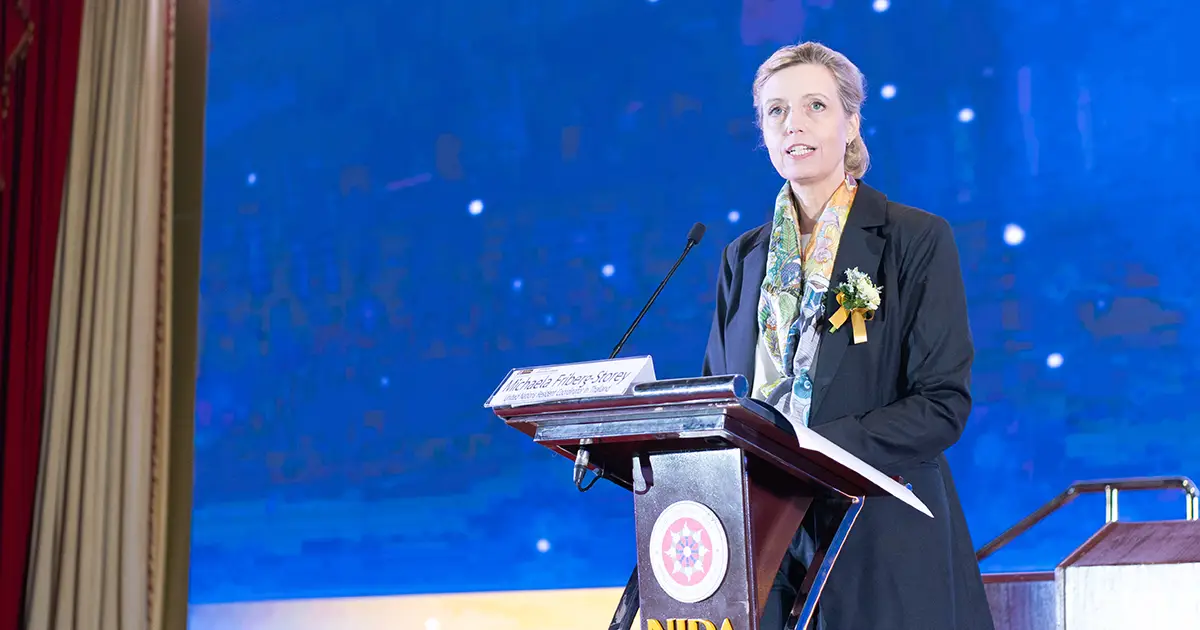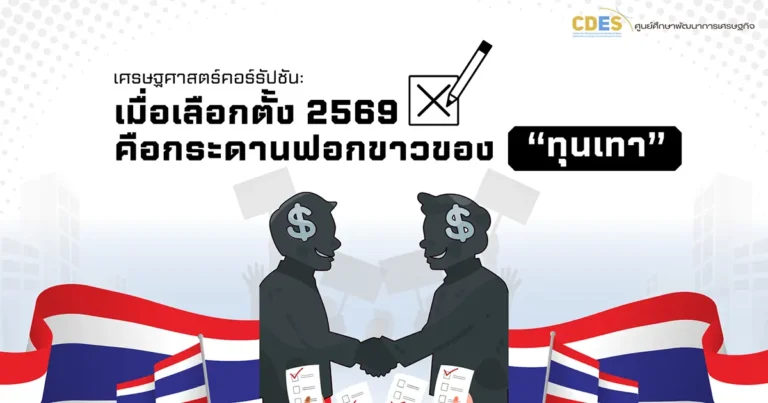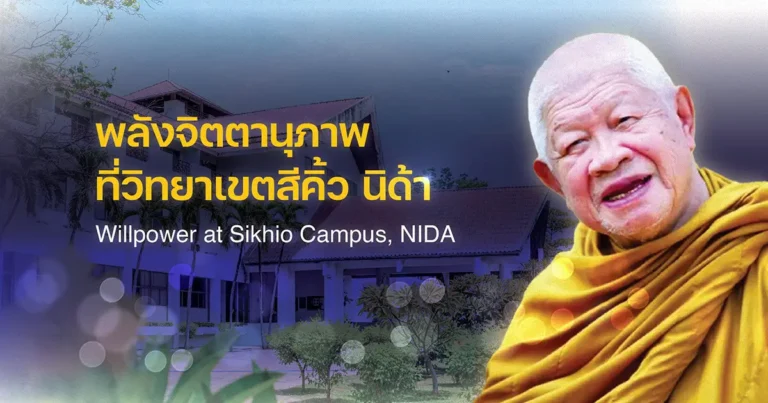By Michaela Friberg-Storey
UN Resident Coordinator in Thailand
Summary of keynote highlights by
Assoc. Prof. Patthareeya Lakpetch, Ph.D.
As the world stands at the crossroads of a polycrisis—where climate change, inequality, conflict, and technological disruption collide—Michaela Friberg-Storey reminded the NIC-NIDA 2025 audience that we are also entering the dawn of an Intelligent Age. This is an era where artificial intelligence, biotechnology, and digital innovation redefine not only economies and governance, but the very nature of human cooperation.
She cautioned that time is running short. With only five years left to achieve the Sustainable Development Goals (SDGs), progress in many areas has slowed while nearly one-fifth of the targets are moving backward. “We are living in an age that tests our resilience like never before,” she remarked, urging the global community to move beyond risk management and focus instead on harnessing the opportunities of intelligence for the common good.
To this end, Friberg-Storey announced two new UN mechanisms for AI governance — the Scientific Panel on AI and the Global Dialogue on AI — established to bridge research, policy, and ethics. Their creation marks a significant milestone for international collaboration and reflects Thailand’s leadership, as demonstrated through its co-hosting of the Global Conference on Ethics in AI with UNESCO.
Her address outlined three interconnected priorities. First, Knowledge and Innovation: technology and human capability are now the world’s most valuable resources. In Thailand, the UN is using AI for decarbonization, disaster preparedness, digital education, and cybersecurity training for women and educators. Notably, AI-based health and social protection systems have enabled thousands of stateless people in Northern Thailand to access essential services more quickly — a clear example that digital inclusion can lead to human inclusion.
Second, Empowering the Next Generation: young people are not passive recipients of technology but active drivers of change. Through the Sustainable University Network (SUN), which connects 59 institutions and over 600,000 students, Thailand demonstrates how sustainability can be embedded in education and mindset from the ground up.
Third, Partnerships for the Future: as Friberg-Storey stated, “Global goals are only words on paper until we act together.” Multilateralism in the 21st century, anchored in the UN’s Pact for the Future, calls for governments, businesses, academia, and citizens to co-create solutions. In Thailand, 21 UN agencies are already working in unity to build a low-carbon, inclusive, and high-income society by 2037.
Her closing message carried both realism and hope: while the Intelligent Age offers tools of unprecedented power, the challenge is to ensure they serve humanity rather than outpace it. And as she smiled toward the young participants, she urged:
“Don’t forget us—include us too. Innovation must be inclusive, intergenerational, and guided by our shared humanity.”
ปาฐกถาพิเศษ “ใช้ยุคแห่งปัญญาเพื่อประโยชน์ร่วมของมนุษยชาติ”
โดย Michaela Friberg-Storey
ผู้ประสานงานสหประชาชาติประจำประเทศไทย
สรุปโดย รองศาสตราจารย์ ดร.พัทรียา หลักเพ็ชร
ในห้วงเวลาที่โลกกำลังเผชิญ “วิกฤตซ้อนวิกฤต” (Polycrisis) — ไม่ว่าจะเป็นการเปลี่ยนแปลงสภาพภูมิอากาศ ความเหลื่อมล้ำ ความขัดแย้ง และความปั่นป่วนทางเทคโนโลยี — Michaela กล่าวย้ำว่า มนุษยชาติกำลังก้าวเข้าสู่ “ยุคแห่งปัญญา (Intelligent Age)” ยุคที่เทคโนโลยีปัญญาประดิษฐ์ ชีวภาพ และนวัตกรรมดิจิทัล กำลังพลิกโฉมเศรษฐกิจ การบริหาร และรูปแบบความร่วมมือของมนุษย์ทั่วโลก
ท่านได้กล่าวอย่างชัดเจนว่า เวลาสำหรับการบรรลุเป้าหมายการพัฒนาที่ยั่งยืนเหลือไม่มาก อีกเพียง 5 ปีเท่านั้น ในขณะที่ความคืบหน้าในหลายด้านชะลอตัว และเกือบหนึ่งในห้าของเป้าหมายกำลังถอยหลัง ท่านกล่าวย้ำว่า “เรากำลังอยู่ในยุคที่ทดสอบความเข้มแข็งของมนุษย์อย่างไม่เคยมีมาก่อน” และตั้งคำถามสำคัญว่า มนุษย์จะสามารถใช้พลังแห่งปัญญาเพื่อประโยชน์ร่วมของทุกคนได้อย่างไร
ในการบรรยาย ท่านได้เสนอแนวทางสำคัญ 3 ประการ ซึ่งเชื่อมโยงกันอย่างเป็นระบบ
หนึ่ง – ความรู้และนวัตกรรม : มนุษย์และเทคโนโลยีคือทรัพยากรที่ทรงคุณค่าที่สุด สหประชาชาติในประเทศไทยได้ประยุกต์ใช้ AI ในการลดการปล่อยคาร์บอน การเตรียมรับมือภัยพิบัติ การพัฒนาทักษะดิจิทัล และการอบรมความปลอดภัยทางไซเบอร์แก่ผู้หญิงและครู นอกจากนี้ AI ยังช่วยให้ผู้ไร้สัญชาติหลายพันคนในภาคเหนือเข้าถึงบริการด้านสุขภาพและสวัสดิการสังคมได้รวดเร็วขึ้น แสดงให้เห็นว่า “การเข้าถึงเทคโนโลยีดิจิทัล” สามารถนำไปสู่ “การเข้าถึงความเป็นมนุษย์” ได้จริง
สอง – การเสริมพลังคนรุ่นใหม่ : เยาวชนไม่ใช่เพียงผู้รับผลของเทคโนโลยี แต่คือผู้สร้างการเปลี่ยนแปลงแห่งอนาคต ผ่านเครือข่ายมหาวิทยาลัยเพื่อความยั่งยืน (SUN) ที่เชื่อมโยงสถาบัน 59 แห่ง และนักศึกษากว่า 600,000 คน ประเทศไทยได้แสดงให้เห็นว่า แนวคิดเรื่องความยั่งยืนสามารถถูกบูรณาการเข้าไปในระบบการศึกษาและวิธีคิดของคนรุ่นใหม่ได้ตั้งแต่ระดับรากฐาน
สาม – หุ้นส่วนเพื่ออนาคต : ท่านเน้นย้ำว่า “เป้าหมายระดับโลกจะเป็นเพียงถ้อยคำบนกระดาษ หากเราไม่ลงมือทำร่วมกัน” ความร่วมมือพหุภาคีในศตวรรษที่ 21 ภายใต้กรอบพันธสัญญาเพื่ออนาคตที่ยั่งยืน (Pact for the Future) ของสหประชาชาติต้องอาศัยการประสานพลังของภาครัฐ เอกชน สถาบันการศึกษา และประชาชน ซึ่งในประเทศไทยสหประชาชาติทำงานร่วมกับหน่วยงาน 21 แห่ง เพื่อสร้าง เศรษฐกิจคาร์บอนต่ำที่ครอบคลุมและนำไปสู่ประเทศรายได้สูงภายในปี 2577 โดยยึดหลัก “ไม่ทิ้งใครไว้ข้างหลัง”
ในช่วงท้ายของการบรรยาย ท่านได้ทิ้งข้อคิดที่ทั้งเรียบง่ายแต่ทรงพลังไว้ว่า แม้ “ยุคแห่งปัญญา” จะมอบเครื่องมืออันยิ่งใหญ่ให้แก่มนุษยชาติ แต่ภารกิจสำคัญที่สุดคือการทำให้เทคโนโลยียังคง “รับใช้มนุษย์” ไม่ใช่ให้มนุษย์ “ตกอยู่ใต้อำนาจของเทคโนโลยี” ท่านได้กล่าวกับผู้เข้าร่วมโดยเฉพาะคนรุ่นใหม่ด้วยรอยยิ้มว่า “อย่าลืมพวกเราด้วย — การพัฒนาเทคโนโลยีต้องครอบคลุมทุกช่วงวัย ต้องสร้างนวัตกรรมที่ไม่ทิ้งใครไว้ข้างหลัง และยึดโยงอยู่บนคุณค่าความเป็นมนุษย์ร่วมกัน”




